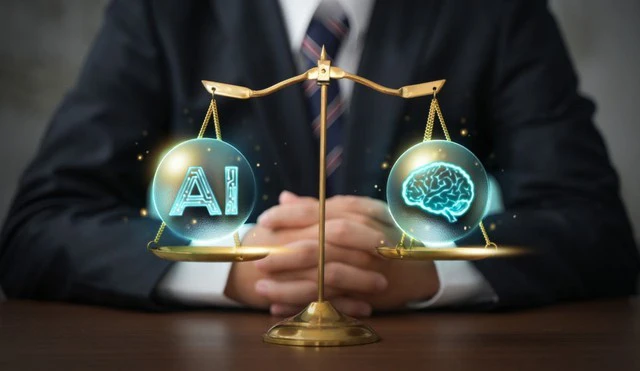Technology companies argue that AI is still in its infancy and should be given the conditions to develop. However, the increasing unemployment caused by AI is raising questions about the exploitation of its copyright.

Reasons why Galaxy AI could revolutionize the smartphone industry Poor AI writing prompts many companies to urgently hire “AI writers” to improve quality AI-powered PCs will need at least 16GB of RAM to operate Hidden threat: AI can mimic handwriting authentically Evidence shows Google’s special favoritism for Samsung Galaxy S24, surpassing even the Pixel 8 Pro OpenAI and the $450 billion copyright lawsuit: Is this the end for AI and ChatGPT? – Image 1.
According to Vox, Napster was once a free music-sharing website before Spotify and Apple Music were born, creating a frenzy among college students in the 1990s. However, this also attracted the attention of recording companies.
Then, in 2001, a federal court ruled that Napster violated copyright, putting an end to the boom in the music market.
Now, as artificial general intelligence (AI) rises with the success of OpenAI’s ChatGPT, the copyright battle is reignited as many companies accuse this technology of benefiting from the theft of intellectual property.
At the end of 2023, the New York Times (NYT) filed a lawsuit against both OpenAI and Microsoft, alleging that they stole copyrighted content to build ChatGPT and profited from it.
Immediately, the Senate Judiciary Committee on Privacy, Technology, and Law (SJS) held a hearing on whether companies developing AI should pay copyright fees when using input information.
OpenAI and the $450 billion copyright lawsuit: Is this the end for AI and ChatGPT? – Image 2.
According to Professor James Grimmelmann of Cornell Law School, discussions and hearings will continue for a long time until there is a consensus among the majority of lawmakers. Therefore, the United States will take a long time to take any legislative action against copyright with AI.
This also means that new technology will continue to flourish in the market for a long time before facing sanctions.
$450 billion
According to Vox, many technology companies believe that AI should be allowed to develop because it is still in its early stages, so it should be allowed to use diverse information from the Internet.
However, with more and more people losing their jobs due to AI, people are beginning to question whether this new technology is profiting from copyright infringement for its input information.
The New York Times argues that even new technologies must comply with copyright law, no matter how interesting they may be.
The reason is that if new technologies like AI are exempt from copyright, content producers or ordinary workers will eventually cease to exist. People will no longer want to create content or do anything else just to benefit AI.
According to Vox, an increasing number of people agreeing on copyright law may be a turning point for AI, even a punctuation mark for this new technology.
Enforcing copyright fees will make AI extremely expensive when using information from the Internet to build models.
Taking ChatGPT as an example, if a question is asked about the fall of the Berlin Wall in 1989, this technology will gather information from the Internet, which could very well be from detailed articles in the NYT to answer.
The large language model (LLM) that builds ChatGPT is trained on over 500 gigabytes of data, including online media archives.
In other words, copyrighted data is a key factor that makes AI powerful and turns companies like OpenAI into such valuable entities.
OpenAI and the $450 billion copyright lawsuit: Is this the end for AI and ChatGPT? – Image 3.
This is considered a major reason why AI can replace many jobs when they “plunder” other people’s content on the Internet for free to produce products faster and cheaper than usual.
The NYT cited ChatGPT’s responses matching verbatim their own articles. OpenAI responded that these were rare errors and they are trying to improve ChatGPT, also claiming that the NYT “trapped” the chatbot through questions to make it produce answers similar to their articles.
Despite that, the NYT rebuked that OpenAI is profiting billions from copyright to build a machine from the efforts of content producers.
According to an estimate, the NYT could claim $450 billion in damages based on millions of articles that were copied, such as mentioned.
Countermeasures
OpenAI is well aware of the weaknesses of the new technology, including copyright issues, alongside challenges such as energy consumption and encountering many errors.
Therefore, the company has decided to pay in advance to content owners to settle lawsuits before things get more serious.
OpenAI has announced a successful licensing agreement with news organizations such as the Associated Press and Axel Springer. The company is also negotiating with the NYT to reach an agreement.
Although it is not clear how much OpenAI will have to pay, Information on January 4, 2024, reported that the creator of ChatGPT proposed a price of $1-5 million for news articles they used as input information to build the LLM.
However, this amount is controversial as it is too small compared to OpenAI’s valuation of $100 billion and the benefits that the new technology can bring.
OpenAI and the $450 billion copyright lawsuit: Is this the end for AI and ChatGPT? – Image 4.
It is worth noting that the NYT is not the only one suing OpenAI, as more and more organizations and individuals are speaking out to demand copyright rights for this new technology.
A series of cases where writers accuse ChatGPT of copying ideas, works, or content developers having their source code stolen, or works of art being blatantly “plagiarized” have erupted since the AI technology boom.
“If you lose in the copyright battle, the financial loss and the risk of collapse are enormous,” warned Corynne McSherry, legal director of the Electronic Frontier Foundation.


Related post
5 Tips to Style Hoodies on Cold Winter Days
As winter settles in, many of us find ourselves reaching for cozy essentials that provide warmth and comfort. One such wardrobe staple is the hoodie.
The Truth Behind the Rumor ‘Santa Claus Is Ugly’ That Surprises Many
As the holiday season approaches, the character of Santa Claus emerges in various forms, his iconic red suit and white beard eliciting warmth and joy
Guide to Creating a Heavy Metal Sound in the Style of Tony Iommi
Heavy metal is a genre rich with history and technical prowess, and few guitarists have influenced its sound as profoundly as Tony Iommi, the legendary
Breaking Down the Key Tactical Edgeas in the Oakland Raiders Lineup
Breaking Down the Key Tactical Edges in the Oakland Raiders’ Lineup reveals not just a football team but a storied franchise with an indomitable spirit.
The Most Heartwarming Moments of Spider Man On Screen
The world of Spider-Man is not just filled with thrilling battles and breathtaking stunts; it’s a tapestry woven with moments of profound empathy, love, and